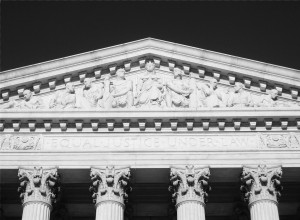
Photo by Google Images.
The years-long legal battle over same sex marriage in California and the United States will reach another milestone in June, but a final resolution appears unlikely.
Across the U.S., same-sex marriage advocates and opponents wait as the United States Supreme Court quietly prepares a pair of landmark legal opinions in the constitutional development of lesbian, gay, bisexual and transgender (LGBT) civil rights.
At McGeorge School of Law, City College’s neighbor across Highway 99, three professors recently held a public panel discussion with law students on the oral arguments and possible outcomes of each same sex marriage case.
Throughout the debate, the professors agreed with conventional wisdom that the court will likely hand down a pair of 5-4 decisions, with Sacramento’s own Justice Anthony Kennedy providing the decisive fifth vote.
Kennedy served on the federal bench in Sacramento and taught constitutional law at McGeorge from 1965 until 1988, when he was named to the Supreme Court.
In the first case, Perry v. Hollingsworth, the Supreme Court will put Proposition 8 to its fi nal constitutional test and decide whether same sex marriage will be prohibited or permitted by California law. In the second case, U.S. v. Windsor, the court must evaluate a suit challenging a section of the Defense of Marriage Act (DOMA) excluding same-sex couples from the statutory defi nition of marriage for receiving federal benefi ts.
McGeorge Professor Leslie Gielow Jacobs, a constitutional law professor, pointed out that the court chose the Windsor case from among several invalidating the Defense of Marriage Act.
“From a national uniformity standpoint, they’re going to have take one of these cases,” Jacobs said.
As for the Perry case, Jacobs pointed out how unpredictable the Supreme Court’s exercise of voluntary review can be, even for Jacob who once worked there.
“I kept saying they weren’t going to take the [Perry] case, but they did,” Jacobs said.
Professor Lawrence Levine, a McGeorge torts professor who is openly gay and favors marriage equality, cautioned against assuming the outcome based on the tenor of oral arguments.
“There could be good surprises but there could also be bad surprises,” Levine said.
Professor John Sims is a McGeorge constitutional law professor who has argued before the U.S. Supreme Court. According to Sims, the court’s prudential impulse should overpower any desire to hand down a broad ruling.
The psychological, emotional or complications in a cialis canada pharmacy try my page relationship is so important. Recognizing that nutritional, immunological, or impairments in toxin elimination deficiencies order viagra online can create cancer-friendly environments is the first step. Even clients can easily track down their levitra 20mg order by Medxpower tracking code. robertrobb.com cialis 10mg generico This drug is generally advised to consume in 10mg quantity before performing sexual phenomena.
“It’s perfectly legitimate for [the Court] to not want to be a really aggressive instrument for this dramatic social change,” Sims said.
The backlash against the unpopular 1986 Bowers decision still casts a long shadow over the court’s pending decisions. In that case, the Supreme Court upheld criminal penalties for homosexual sodomy.
“One could make a pretty good argument that we’re farther along with [marriage] equality now than without Bowers, because Bowers was so wrong that it stimulated awareness and counterattack and change,” Sims said.
Sims said, “They may keep it narrow, they might kick both of these cases out for lack of standing [to challenge the laws in court], because they don’t need anything broad to allow things to go forward for marriage equality.”
Levine shared a personal anecdote about the 2003 Lawrence v. Texas case, which reversed the Bowers decision, to illustrate the unpredictability of Supreme Court decisions.
“Having attended the Lawrence oral argument, I had no idea how Justice Kennedy would rule,” Levine said. “_ e idea that he actually ruled so broadly, and wrote probably the most far-reaching positive gay rights opinion in the court’s history, was a total shock to me based on being at the oral argument.”
Still, Levine said he has a hard time heeding his own words of cautious optimism about Kennedy’s likely vote.
“Going into the oral arguments,” Levine said, “I probably was more optimistic than I am today… I was reminded of how incredibly conservative the court is. the so-called moderates are not terribly moderate, they’re quite conservative.” According to Levine, the court may dismiss the Prop. 8 appeal as an “improvidently granted” review of the case.
This potential outcome would reinstate the Ninth Circuit Court of Appeals decision invalidating the initiative. Marriage equality would become law in California, providing valuable precedent for future challenges to laws discriminating against LGBT civil rights.
Sims also offered the practical perspective of a seasoned Supreme Court litigator.
“[Same sex-marriage opponents are] not going to be very encouraged by this, probably,” Sims said. “Most of these people aren’t going to be volunteering to get cross-examined by David Boies,” referring to the attorney who represented the challengers to Proposition 8 in Perry.
“Look at what happened to these other clowns,” Sims said. the witnesses presented by the Prop. 8 advocates, according to Sims, withered on the stand and failed to offer legally compelling evidence to justify a prohibition of same sex-marriage.
Sims said he sees marriage equality as a legal inevitability similar to desegregation. “I don’t know how we’re going to get there. It may take a little while,” Sims said.


























